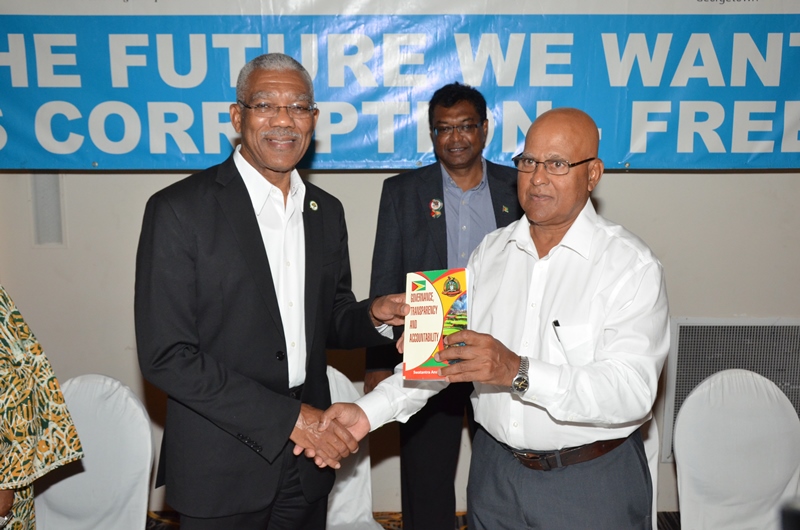President David Granger yesterday said that it is his view that corruption in Guyana is more widespread outside of government and said a concerted effort must be made by all to tackle the scourge and go after the “real rogues”.
Speaking on Saturday at the launching of a book by former Auditor General, Dr Anand Goolsarran at the Pegasus Hotel, Granger said, according to a release from the Ministry of the Presidency: “Some people describe corruption as the abuse of entrusted power for private gain, but I think that there should be a more plastic interpretation. I do believe that the real sources of corruption are evident in other crimes; bribery, contraband smuggling, cronyism, fraud, graft, nepotism. These are all aspects of the monster of corruption. These crimes can escape detection because of the lack of transparency and that is why people like opaque transactions because it conceals corruption. They can go unpunished because of a lack of accountability and they can flourish because of weak governance. It is my view that corruption in Guyana is more widespread outside of government”.
According to the release, he said that while there may be instances of official graft, Government workers are not the only “villains”, as corruption can be found within the private sector, in offshore banks and in tax havens.
The President charged that analyses of corruption tended to overlook what he termed the “real rogues” in corruption.
“Corruption studies tend to ignore the seminal role of the real rogues; the people who construct vessels for the sole purpose of smuggling cheap fuel into this country, those who conspire to import and export illegal drugs and who smuggle gold and diamonds out of the country to avoid paying royalties across the borders and into unmonitored airstrips and throughout numerous creeks and rivers… Many studies tend to ignore the ‘back-trackers’, who evade the payment of duties; the tax dodgers, who do not pay value added tax and NIS contributions. Studies also tend to ignore the foreign destinations of dirty money. The lords of corruption do not stack their millions in mattresses. There are many eyebrow-raising, no questions asked havens for dirty money,” he said.
He called on the public to play its part in the fight.

“The public must play its part. The international community must play its part to change public attitudes towards corruption and to allow for greater transparency and accountability. Efforts of Government in improving accountability and transparency will be frustrated unless these partners play their part… Corruption must therefore be confronted. This task will not be easy. Corruption is resilient and highly resistant to efforts of eradication. Its roots have penetrated deep into the sub-soil of national life. It must be uprooted if Guyanese are to have a chance at the ‘good life’,” Granger said.
Noting that corruption is corrosive as it weakens law enforcement, the President said that good governance, transparency and accountability are more than the antidote for corruption. He said this would also be a remedy for graft in the private sector, professional organisations, civil society and international organisations.
“It will be hypocritical to think that corruption is a crime only (of) a few cops or revenue clerks, who stretch out their hands for bribes. Bribery is a crime indeed and it must be prevented. It must be punished but two big questions remain, who really can afford to pay the bribes and where do proceeds of bribery and corruption go?” the President asked.
He added, according to the release, corruption “weakens public trust in government and the institutions of government… Corruption largely discriminates against the poor and it favours the rich. It removes resources from the Government or from agencies, which should be directed towards improving the quality of life and what should be a public good is directed to private gain.”
He declared that the government is determined to excise corruption, improve transparency and implement greater accountability on the foundation of robust institutions.
“The independence and integrity of institutions must be strengthened to prevent and combat corruption. The Government has already passed legislation assuring the financial independence of the National Assembly and the Judiciary, important branches of the state alongside the executive. We must now pay attention to important institutions that exercise oversight of the Government… The Public Service Commission; we must have an ‘unbribable’ public service and the persons in that office must, therefore, be above reproach themselves; the Public Procurement Commission, the Integrity Commission, the Guyana Elections Commission, Office of the Auditor General, Office of the Ombudsman, the Police Complaints Authority,” the President said.
The book entitled `Governance, Transparency and Accountability’ features articles written by Goolsarran for the Stabroek News Accountability Watch column on Monday.
The release said that Head of the State Assets Recovery Unit (SARU), Dr. Clive Thomas, described the book as a “collection of gems.” He said that Goolsarran’s extensive knowledge and experience can now be shared through the book.




